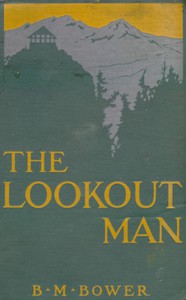The Lookout Man by B. M. Bower (good books to read for adults .txt) 📗

- Author: B. M. Bower
Book online «The Lookout Man by B. M. Bower (good books to read for adults .txt) 📗». Author B. M. Bower
When his companion stopped to let the horses "get their wind," Jack would turn in the saddle and look back over the network of gulches and deep canyons to where the valley peeped up at him shyly through the trees, and would think that every step made him that much safer. He did not face calmly the terror from which he had fled. Still mentally breathless from the very unexpectedness of the catastrophe, he shrank from the thought of it as if thinking would betray him. He had not so far concerned himself with his future, except as it held the possibility of discovery. So he quizzed his companion and got him talking about the mountains over which he was to play guardian angel.
He heard a good deal about hunting and fishing; and when they climbed a little higher, Hank Brown pointed out to him where a bear and two half grown cubs had been killed the fall before. He ought to have a rifle, said Hank. There was always the chance that he might get a shot at a bear; and as for deer, the woods were full of them. Then he told more stories and pointed out the very localities where the incidents had occurred.
"See that rocky peak over there? That's where the bears hole up in the winter. Network of caves, up there. King Solomon's the name the people that live here call it—but it's down on the map as Grizzly Peak. Ain't any grizzlies, though—black bear mostly. They're smaller and they ain't so fighty."
It was on the tip of Jack's tongue to observe that a man might hide out here for months and months and never be seen, much less caught; but he checked himself, and remarked only that he would certainly have to get a gun. He would like, he declared, to take home some good heads, and maybe a bear skin or two. He forced himself to speak of home in the careless tone of one who has nothing to hide, but the words left an ache in his throat and a dull heaviness in his chest.
Hank Brown went on talking and saw nothing wrong with his mood. Indeed, he never saw anything wrong with a man who would listen to Hank's hunting and fishing stories and not bore him with stories of his own prowess. Wherefore, Jack was left alone in peace to fight the sudden, nauseating wave of homesickness, and in a little while found himself listening to the steady monotone of Hank Brown's voice.
So, they came to a tiny, sunken meadow, one side of which was fenced with poles, rimmed round with hills set thick with heavy timber. On the farther side of the meadow, almost hidden from sight, was a square log cabin, solid, gloomily shaded and staring empty-eyed at a tiny, clear stream where the horses scared an eight-inch trout out of a pool when they lowered eager noses to drink thirstily.
After that they climbed up into a more open country, clothed with interlaced manzanita bushes and buck brush and thickets of young balsam fir. Here, said Hank Brown, was good bear country. And a little farther on he pulled up and pointed down to the dust of the trail, where he said a bear had crossed that morning. Jack saw the imprint of what looked like two ill-shaped short feet of a man walking barefooted—or perhaps two crude hands pressed into the dirt—and was thrilled into forgetfulness of his trouble.
Before they had gone another mile, he had bought Hank's rifle and all the cartridges he happened to have with him. He paid as much as a new rifle would have cost, but he did not know that—though he did know that he had scarcely enough money left in his pocket to jingle when the transaction was completed. He carried the rifle across the saddle in front of him and fingered the butt pridefully while his eyes went glancing here and there hopefully, looking for the bear that had crossed the trail that morning. The mere possession of the rifle bent his mood toward adventure rather than concealment. He did not think now of the lookout station as a refuge so much as a snug lair in the heart of a wonderful hunting ground.
He wanted to hear more about the bear and deer which Hank Brown had shot on these slopes. But Hank was no longer in the mood for recounting his adventures. Hank was congratulating himself upon selling that rifle, which had lately shown a tendency to jam if he worked the lever too fast; and was trying to decide just what make and calibre of rifle he would buy with the money now in his pocket; and he was grinning in his sleeve at the ease with which he had "stung" this young tenderfoot, who was unsuspectingly going up against a proposition which Hank, with all his love for the wild, would never attempt of his own free will.
At first sight, the odd little glass observatory, perched upon the very tip-top of all the wilderness around, fascinated Jack. He had never credited himself with a streak of idealism, nor even with an imagination, yet his pulse quickened when they topped the last steep slope and stood upon the peak of the world—this immediate, sunlit world.
The unconcealed joy on the face of the lookout when they arrived did not mean anything at all to him. He stood taking great breaths of the light, heady air that seemed to lift him above everything he had ever known and to place him a close neighbor of the clouds.
"This is great!" he said over and over, baring his head to the keen breeze that blew straight out of the violet tinted distance. "Believe me, fellows, this is simply great!"
Whereupon the fireman who had spent two weeks there looked at him and grinned.
"You can have it," he said with a queer inflection. "Mount Lassen's blowing off steam again. Look at her over there! She's sure on the peck, last day or so—you can have her for company. I donate her along with the sun-parlor and the oil stove and the telescope and the view. And I wish you all kinds of luck. How soon you going back, Hank? I guess I better be showing this fellow how to use the chart; maybe you'd like something to eat. I'm all packed and ready to hit the trail, myself."
In the center of the little square room, mounted on a high table, was a detail map of all the country within sight of the station—and that meant a good many miles of up and down scenery. Over it a slender pointer was fitted to a pin, in the center of the map, that let it move like a compass. And so cunningly was the chart drawn and placed upon the table that wherever one sighted along the pointer—as when pointing at a distant smudge of smoke in the valley or on the mountainside—there on the chart was the number by which that particular spot was designated.
"Now, you see, suppose there's a fire starts at Massack—or along in there," Ed, the lookout





Comments (0)